Tagungen & Konferenzen | Conferences
Weitere Veranstaltungen in Kürze. | More events coming soon.
Interdisziplinares Symposium:
„Emanzipative Erotik. Begehren, Körperlichkeit und soziale Transformation in Texten und Künsten seit dem 19. Jahrhundert“
Sehr geehrte Studierende,
liebe Kolleg*innen,
wir laden Sie herzlich zum interdisziplinären Symposium „Emanzipative Erotik. Begehren, Körperlichkeit und soziale Transformation in Texten und Künsten seit dem 19. Jahrhundert“ ein, das am
📅 Freitag, den 14. November 2025, von 9:00 bis 16:30 Uhr
📍 im Freiburg Institute for Advanced Studies (FRIAS, Albertstraße 19, 79104 Freiburg im Breisgau)
stattfindet.
Das Symposium widmet sich der Frage, wie Konzepte von Erotik, Begehren und Körperlichkeit seit dem 19. Jahrhundert in Literatur, Kunst und anderen sprachlich-kulturellen Ausdrucksformen als Räume sozialer und ästhetischer Emanzipation verhandelt werden. Im Mittelpunkt steht der interdisziplinäre Austausch zwischen Literatur-, Kultur- und Sprachwissenschaft.
Wir freuen uns auf anregende Vorträge, Diskussionen und Begegnungen, die neue Perspektiven auf das Verhältnis von Erotik und sozialer Transformation eröffnen.
Um eine bessere Planung zu ermöglichen, bitten wir um Anmeldung per E-Mail an:
📧 daniel.mandel@romanistik.uni-freiburg.de
 |
 |
Gentrification Imaginaries: Stories of Urban Transformations and Displacement
The international conference “Gentrification Imaginaries: Stories of Urban Transformations and Displacement” brings together scholars from literary studies, media studies, cultural studies, political science, sociology, and geography who, in their respective research areas, have begun to explore the implications of understanding gentrification as not only a socioeconomic phenomenon but also dependent on questions of storytelling and cultural imagination. We aim to address questions such as, how do we define this complex phenomenon, and how do narratives about it shape our understanding of gentrification? In what ways do intersectional factors such as class, race, gender, and age impact our understanding of this process? What stylistic elements define stories of gentrification, and how do they vary across different media and genres? Can we consider gentrification itself as a genre? The conference seeks to help establish a growing network of literary and cultural gentrification studies by fostering the interdisciplinary dialog necessary to study processes of gentrification. In order to participate, please register with Maria.sulimma@anglistik.uni-freiburg.de
Public events as part of the conference (no need to register)
- 12. June 2024, 18:00 c.t., KGI 1221: Roundtable “Gentrification Debates across Disciplines: Definitions, Methods, Practices”
with Japonica Brown-Saracino (Boston University)
Thomas Heise (Pennsylvania State U/Abington)
Hanna Henryson (Stockholm/Linnaeus)
and Andrej Holm (HU Berlin)
- 13 June 2023, 18:30 FRIAS Lecture Hall/Pathologie Hörsaal (Albertstr. 19):
Poetry Reading/Discussion The Ruins of Nostalgia (2023) by Donna Stonecipher
Donna Stonecipher in Conversation with Davy Knittle (University of Delaware)
More information here
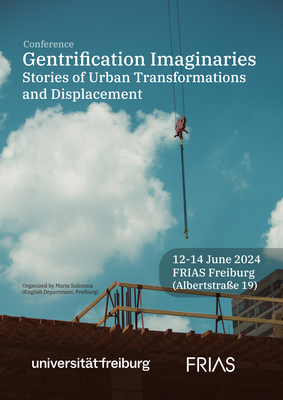
Interdisziplinäres Doktorand*innen Symposium
Liebe Humanities-Community,
wir freuen uns sehr, Sie auf den Termin des nächsten Interdisziplinären Doktorand*innensymposiums der Graduiertenschule Humanities hinweisen zu können: Am Donnerstag, 13. Juni, von 10:30 bis 18 Uhr (Co-Creation-Raum, Alte Universität) geben Promovierende der Geistes-, Sozial- und Kulturwissenschaften Einblick in ihre Dissertationsprojekte. Wir freuen uns in diesem Semester über ein besonders vielseitiges Programm, das zeitnah auf unserer Webseite veröffentlicht wird.
Wir freuen uns sehr über Ihre Anmeldung per Mail an: lisa.blitz@humanities.uni-freiburg.de.
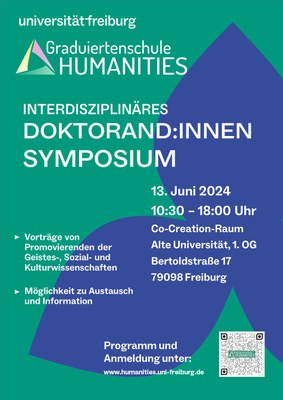
Archive
Queer (Second) Cities
August 30-31, 2023 | Online
On August 30 and 31, 2023, JProf. Dr. Maria Sulimma is co-organizing the online conference Queer (Second) Cities together with Dr. Lena Mattheis from the University of Surrey.
The molly houses of London, the lesbian salons of Paris, the queer club scene of Berlin: LGBTQIA2S+ spaces are frequently considered urban and Western by default. Queer community in physical space is therefore often mapped onto a very limited number of metropolises, pushing rural queerness, the global South, queer periphery and queer second cities to the margins. Jack Halberstam’s critique of metronormativity (In a Queer Time and Place, 2005) as “the conflation of ‘urban’ and ‘visible’ in many normalizing narratives of gay/lesbian subjectivities” (36) can thus be further specified as referring to particular kinds of urban spaces and excluding others. In this international and interdisciplinary conference, contributors share their research on queer spaces outside of or on the margins of the metropolis, the communities that build and use these spaces, the infrastructures and practices they employ to do so, the cultures that shape queer second cities, and the ways in which all of the above are portrayed in literature, audiovisual media, the news, visual arts and any other media.
Confirmed Keynote Speakers:
Davy Knittle (University of Delaware) and Jas M. Morgan (Toronto Metropolitan University)
To receive the Zoom access for the conference, please register: queersecondcities@gmail.com. The conference program will be made available on the conference website: https://queersecondcities.wordpress.com/.
References:
Ameel, Lieven; Jason Finch and Markku Salmela. Literary Second Cities. Palgrave Macmillan, 2017.
Beauvoir, Simone de. The Second Sex. Vintage Classics, 2015.
Butler, Judith. Gender Trouble: Feminism and the Subversion of Identity. Routledge, 1990.
Halberstam, Jack. In a Queer Time and Place: Transgender Bodies, Subcultural Lives. NYU Press, 2005.
Quintana-Vallejo, Ricardo. “Mapping Queer Diasporas in Literary Second Cities: Benjamín Alire
Sáenz, Gabby Rivera, and Ocean Vuong.” Literary Geographies 7.2 (2021): 275-291.
Symposium: Echoes of Empire
July 13, 2023 | University of Freiburg
Echoes of empire resound in present-day politics, social orders, languages and cultures. On July 13, there will be the symposium Echoes of Empire, which is part of the DFG Research Training Group 2571 Empires: Dynamic Change, Temporality and Post-Imperial Orders and organized by Prof. Dr. Barbara Korte. This symposium offers perspectives on the topic from historical, linguistic and cultural studies.
It takes place at the Max-Kade-Auditorium 1, Bertoldstr. 17.
| 14:00-14:05 | Introduction | Barbara KORTE |
| 14:05-14:45 | Rethinking the Coloniser after the End of Empire: The Impact of Decolonisation in the Metropoles | Berny SÈBE |
| 14:45-15:25 | Reading Opposition to Empire in Africa and the Black Diaspora: Fanon, Aimé Césaire and Chinua Achebe | Onookome OKOME |
| 15:25-15:45 | Coffee Break | |
| 15:45-16:15 | A Global Lingua Franca in a Postcolonial World: World English Paradoxes in the 21st Century | Christian MAIR |
| 16:15-16:45 | The British Empire in Contemporary British Popular Culture | Barbara KORTE / Sophie BANTLE |
| 16:45-17:00 | Final Discussion | |
| 17:00-18:00 | Recpetion |
Please find the flyer with additional information here.
EUCOR 2023 Annual English Trinational MA and PhD Conference
April 21-22, 2023 | Freiburg University
The English Department is happy to host this year's EUCOR Annual English Trinational MA and PhD Conference with participation of the universities of Basel, Karlsruhe, Mulhouse, and Strasbourg! This year, students and doctoral candidates will again have the opportunity to present their research to a larger audience in a conference setting and discuss the topics with their colleagues from the respective departments.
Conference program:
FRIDAY, APRIL 21
| 10:00-10:30 | Welcome HS 3219 (KG III) |
|
| 10:30-12:30 | Panel 1: Gothic Narratives and Reflections of Death Chair: Anne Bandry (U. of Strasbourg) HS 3219 (KG III) |
|
|
||
| 12:30-14:00 | Lunch Mensa |
|
| 14:00-15:30 |
Panel 2: Ecocriticism |
Panel 3: Language Construction and Utilization Chair: Kübra Aksay (U. of Freiburg) HS 1132 (KG I) |
|
|
|
| 15:30-15:50 | Coffee Break In front of HS 1199 (KG I) |
|
| 15:50-17:20 |
Panel 4: Songs in Memory and Popular Culture |
Panel 5: Early Modern England |
|
|
|
| 19:00 | Dinner Caritas, Wintererstraße |
|
SATURDAY, APRIL 22
| 08:30-09:00 | Arrival In front of HS 1199 (KG I) |
|
| 09:00-10:30 | Panel 6: Victorian Women Chair: Monika Fludernik (U. of Freiburg) HS 1199 (KG I) |
Panel 7: Religion, Spirituality, Christianity Chair: Philipp Schweighauser (U. of Basel) HS 1132 (KG I) |
|
|
|
| 10:30-10:50 | Coffee Break In front of HS 1199 (KG I) |
|
| 10:50-11:50 | Panel 8: (Neo-)Victorian TV Adaptations and Photography Chair: Sämi Ludwig (U. of Upper Alsace) HS 1199 (KG I) |
Panel 9: Language Acquisition Chair: tba HS 1132 (KG I) |
|
|
|
| 11:50-12:10 | Coffee Break In front of HS 1199 (KG I) |
|
| 12:10-13:10 | Panel 10: Thatcher’s Britain Chair: Wolfgang Hochbruck (U. of Freiburg) HS 1199 (KG I) |
Panel 11: Disney Chair: Ece Ergin (U. of Freiburg) HS 1132 (KG I) |
|
|
|
|
13:10 |
Closing Remarks & WIne |
|
To attend the conference, please register here.

Culture at Play: Avatars, Players, and Others
March 10-11, 2023 | Zoom
Scholarly work on video games has often located a major part of the player experiences within the exploration of gameworlds. This was one of the main frameworks under which the last year’s conference, Culture at Play: Spaces - Colours - Stories, offered a platform for an interdisciplinary discussion of video games.
In this follow-up, Culture at Play: Avatars, Players, and Others, we aim to focus on the characters as interlocutors of these much-investigated environments by shifting the debate on the relationships between players and the characters they take the roles of, as well as those they encounter during play.
Keynote speakers:
Richard Bartle (University of Essex), Lena Falkenhagen (UE Hamburg), Sarah Stang (Brock University)
Conference program:
FRIDAY, MARCH 10
| 10:00-11:00 | Keynote Richard Bartle (University of Essex) “Anti-Social Consequences of Social Play” |
| Panel 1: Limbo is Other People - Game Design and Tools for Affect and Immersion Chair: Undine Remmes |
|
| 11:00-11:20 | Angelina Skuratova (Paderborn University) “Re-living the Eternal Present: An Exploration of (Narrative) Loops in Video Games” |
| 11:20-11:40 | Zlatko Bukač and Emilia Musap (University of Zadar) “Fear and Anxiety in Louisiana: Affects and Immersion in Resident Evil 7: Biohazard” |
| 11:40-12:00 | Alesha Serada (University of Vaasa) “Not Actual Gameplay: Affective Non-Playable Characters in Match-3 Game Advertising” |
| 12:00-12:30 | Panel Discussion |
| 12:30-13:30 | Lunch Break |
| Panel 2: Cistemic Spectrum - Topics of Gender and Fluidity Chair: Maria Sulimma |
|
| 13:30-13:50 | Anja Gödl (University of Innsbruck) “A Female Rabbit Called Bonbon and a Male Lion Called Elvis: Gender Theoretical Analysis of the Naming of Characters in Animal Crossing New Horizons” |
| 13:50-14:10 | Rebecca Käpernick (University of Oldenburg) “Girls who Run the (End of the) World - Female Protagonists and Side-Kicks in Post-Apocalyptic Video Games” |
| 14:10-14:30 | Jasmin Bieber (University of Konstanz) “Who is Controlling the Heart?”: Non-Binary Identities and Troubled Player Agency in Deltarune” |
| 14:30-15:00 | Panel Discussion |
| 15:00-15:30 | Coffee Break |
| 15:30-16:30 | Keynote Sarah Stang (Brock University) “Identity, Embodiment, and Monstrosity: Playing as the Nonhuman Other” |
| 16:30 - 17:00 | Coffee Break |
| Panel 3: The Borderlands - Fleeing (into) Society Chair: Jennifer Howard |
|
| 17:00.17:20 | Marie Zarda (Philipps-University Marburg) “‘There Was No Country For People Like Me!’: Ideologies and Identities of Bioshock’s Rapture” |
| 17:20-17:40 |
Carolin Becklas (University of Oldenburg) “Playing ‘Climate Refugees’ in Frostpunk” |
| 17:40-18:00 | Marko Jevtic (University of Konstanz) “Between Interactivity and Activism: Identity Tourism and the 'Playful Translations' of (Radical) Resistance” |
| 18:00-18:30 | Panel Discussion |
| 19:00-21:00 | Two Simultaneous Sessions Workshop 1: Creating Desired Characters. Host: Florian Schäfer Workshop 2: Let’s Play Multiplayer ‘Party’ Games. Host: Janna Kaiser |
SATURDAY, MARCH 11
| 10:00-11:00 | Keynote Lena Falkenhagen (UE Hamburg) “‘Who am I?’ Player-collaboration in Digital Games” |
| Panel 4: “Despite everything, it’s still you.” - Tropes of Character Development Chair: Andreas Rauscher |
|
| 11:00-11:20 | Fiona Schönberg (Mainz University) “‘This is my Story, and it will go the way I want it!’” |
| 11:20-11:40 | Ted Richthofen (University of Bonn) “Niko Bellic: ‘The Gangster as Tragic Hero,’ Criminal Embodiment and Capitalist Escapism in Grand Theft Auto IV” |
| 11:40-12:00 | Carmel Anne Abela (Nagoya University) “Rethinking the Player Character as an Outsider: a Different Perspective on the Playing Experience and Its Implications” |
| 12:00-12:30 | Panel Discussion |
| 12:30-13:30 | Lunch Break |
| Panel 5: Bravely Default - Breaking From or Adhering To Normativity Chair: Ece Ergin |
|
| 13:30-13:50 | Agata Waszkiewicz and Robin Longobardi Zingarelli(University of Lublin/Institute of Digital Games, Malta) “Emergence of Non-Binary Identities in Video Games: a Discourse Analysis Approach” |
| 13:50-14:10 | Xuan Truong (University of Freiburg) “The Feminine Alternate: An Examination of ‘Default’ Avatar Genders in Role Playing Video Games” |
| 14:10-14:30 | Aska Mayer (Aalto University) “Transmutation and Mimicry. Shapeshifting Avatars as Spatial Reaction and Modes of Alienation” |
| 14:30-15:00 | Panel Discussion |
| 15:00-15:30 | Coffee Break |
| 15:30-16:30 | Kübra Aksay, Andreas Rauscher, Undine Remmes (University of Freiburg) “Interdisciplinary Perspectives on Virtual Spaces”: Poster presentation followed by roundtable discussion |
| 16:30 - 17:00 | Coffee Break |
| Panel 6: Choose your fighter! - Representation and Perspectives as Design-Tools Chair: Sarah Busch |
|
| 17:00-17:20 | Tobias Weißer (PH Ludwigsburg) “Nikolay Dybowski's Pathologic as a Hypertextual Contemplation on Modernity and Progress” |
| 17:20-17:40 | Nour Habib (University of Freiburg) “Gender and Race Representation in Tekken” |
| 17:40-18:00 | Panel Discussion |
|
19:00-21:00 |
Conference Dinner (On-Site, in Freiburg) |
To register as an audience member please send an email to cultureatplay@anglistik.uni-freiburg.de indicating your name and institution.
Presentation abstracts:
Please find the PDF-Version of the presentation abstracts here.
About the conference:
Culture at Play: Avatars, Players, and Others is an international conference organized by the English Department at the University of Freiburg, and a follow-up to last year’s Culture at Play: Spaces – Colours – Stories in Digital Games. The conference series aims to open up a space that allows for sophisticated, critical analyses of video games and the cultural field that has emerged around them using an interdisciplinary approach that includes cultural, literary, and media studies.
The conference will take place on March 10 - 11, 2023 via Zoom.
Organizing Committee: Kübra Aksay, Janna Kaiser, Florian Schäfer
Previous iterations:
The conference proceedings of Culture at Play: Spaces – Colours – Stories in Digital Games were compiled by , and
The Long Night of Anglicists
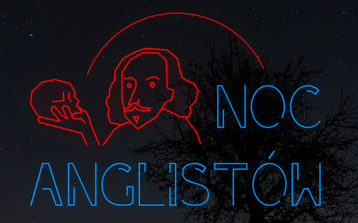 November 25, 4-10 pm | Online
November 25, 4-10 pm | Online
On the 25th of November, the Long Night of Anglicists will take place! Brace yourselves for an evening full of lectures, workshops, and presentations prepared by English teachers from all over Poland. This is a unique event and the main goal is to show the thoughts and scientific potential of English studies in Poland, as well as to unravel myth that English studies is only about language learning.
There will be plenty of online events to attend and participation is free for everyone. To find out more about the specific lectures, workshops, and presentations, please visit the event's website.
Connectivity and its Other | International Conference
July 2, 2022
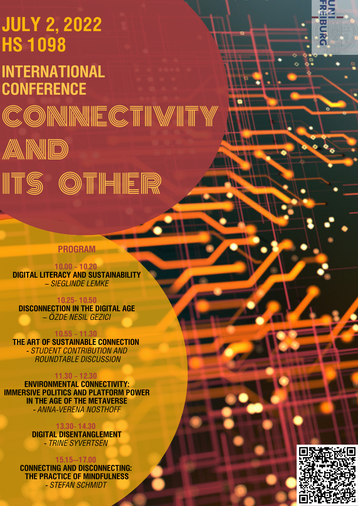
The ubiquity of digital connectivity and the subsequent diminishing of human connection have become truths of our time. This conference starts with the assumption that digital overload takes a toll on people’s ability to connect meaningfully with themselves or with others. As many studies have shown hyperconnectivity can lead to self-centered thinking, narrow-mindedness, and a lack of empathy. The attendant mindset can and often does propel contemptuous forms of social interaction.
While the downsides and risks of hyperconnectivity are well known and widely lamented, contemporary media criticism explores moments of “digital disentanglement,” i.e. users' deliberate strategies to disconnect. This would constitute a resistance or alternative to hyperconnectivity. The “other” of hyperconnectivity then does not only refer to forms of othering (e.g. cyberhate and populist vitriol), which drive polarization and undermine democratic and civil culture.
In this conference we will examine already existent counter-strategies such as digital minimalism, digital self-defense and the digital detox movement as well as the booming mindfulness movement and the emerging academic field of critical digital literacy that train (mental) skills to curtail the harmful effects of hyperconnectivity.
Organized by Prof. Dr. Sieglinde Lemke
From Racial Polarization to Black Liberation | Symposium
February 3, 2021 | Online
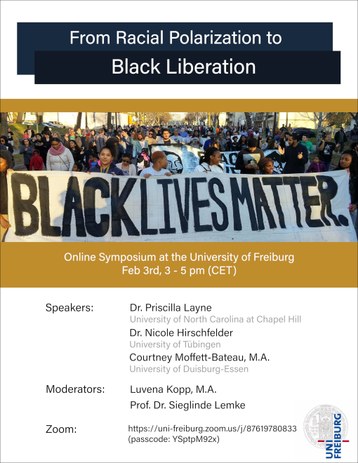 Prof. Dr. Sieglinde Lemke and Luvena Kopp, M.A. are the organizers of a symposium which looks into the current Black movement, its repercussions and its potential to further social transformation. Guest speakers will be Priscilla Layne, Ph.D. (University of North Carolina, Chapel Hill), Dr. Nicole Hirschfelder (University of Tübingen), and Courtney Moffett-Bateau, M.A. (University of Bremen).
Prof. Dr. Sieglinde Lemke and Luvena Kopp, M.A. are the organizers of a symposium which looks into the current Black movement, its repercussions and its potential to further social transformation. Guest speakers will be Priscilla Layne, Ph.D. (University of North Carolina, Chapel Hill), Dr. Nicole Hirschfelder (University of Tübingen), and Courtney Moffett-Bateau, M.A. (University of Bremen).
Black Lives Matter has become the rallying cry of the largest protest movement in U.S. history. As people from various nations and races have joined its protests, the movement has become an indispensable force of social change. This comes at a time of extreme polarization, propelled by increasing political partisanship, wherein rising levels of violence, animosity, and contempt towards members of the other group exacerbate divisions in U.S. society. The recent upsurge of Black Lives Matter, in an era of COVID-19, exposes long-standing racial as well as economic polarization. Expediting the structures of neoliberal capitalism, the pandemic reinforces the precarity of the many while increasing profits for the few. As the pandemic converges with a tradition of racist police brutality, Black lives are the main victims of a dual crisis.
The resurgence of the Black Lives Matter movement links the struggle for Black liberation to a broader struggle for systemic change. "Black liberation," Keeanga-Yamahtta Taylor reminds us in From #BlackLivesMatter to Black Liberation, "is bound up with the project of human liberation and social transformation."
Law and Literature from a Narratological Perspective | International Conference
May 6 – 8, 2021 | Online
Organized by Prof. Dr. Monika Fludernik and Prof. Dr. Frank L. Schäfer. A program from the conference can be found here.
26th EARS Meeting (English and American Rhenish Scholars)
December 3, 2021 | Université Haute-Alsace Mulhouse
Following the meeting, a festive dinner at the Auberge du Zoo was offered by the UHA
Culture at Play: Spaces – Colours – Stories in Digital Games
March 4 – 5, 2022 | Online
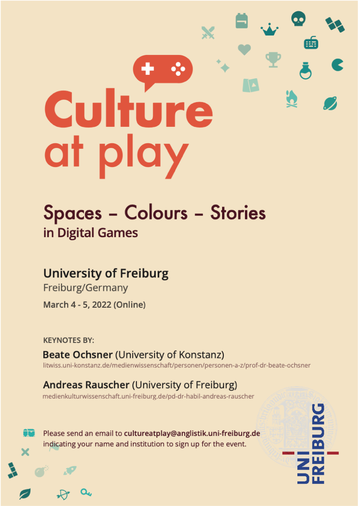 Over the last few decades, video games have left their marginal position in culture and turned into a central experience that holds a permanent place in the lives of many people.
Over the last few decades, video games have left their marginal position in culture and turned into a central experience that holds a permanent place in the lives of many people.
At the same time, they have also grown ever more sophisticated in content as well as audio-visual quality.
As a result, it is not only increasingly important to give them the serious consideration they deserve, but also that this happens in a manner that can do justice to their unique, multimedia mode of expression.
The conference is aiming to open up a space that allows for a sophisticated analysis of video games and the cultural field that has emerged around them using an interdisciplinary approach that includes, cultural, literary, and media studies.
You can find the program for the event, which will be continuously updated, here.

